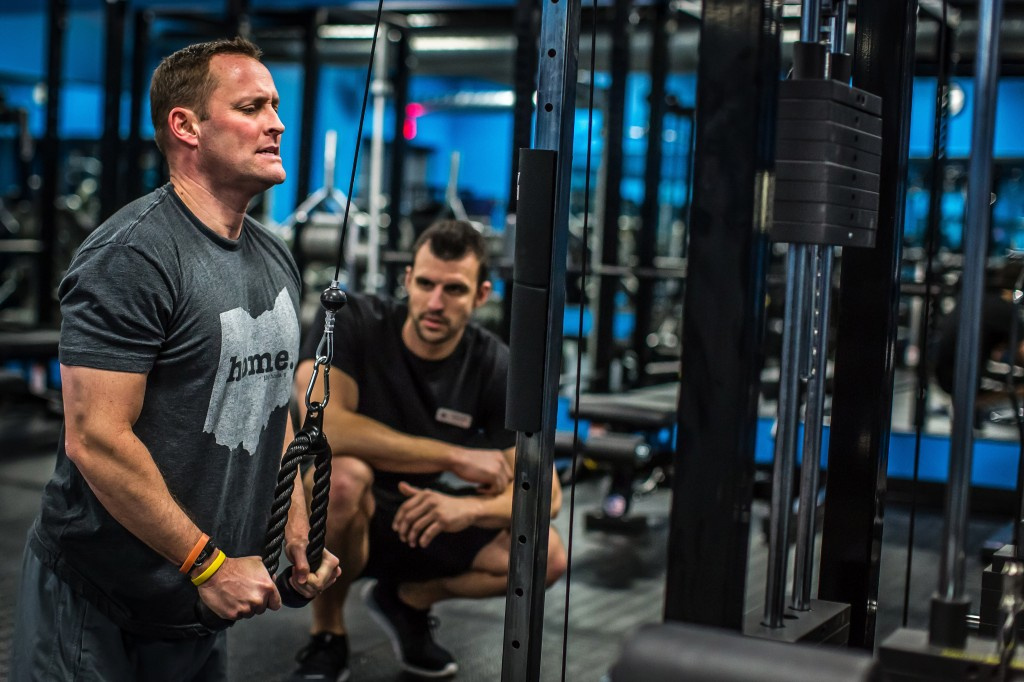Focus on Fitness- Going Beyond Body Composition
 AFS Education
Administrator, Moderator, Practitioner admin
AFS Education
Administrator, Moderator, Practitioner admin
Every day we are bombarded with images of celebrities, models etc. with a “perfect” physique. Reality TV shows such as “The Biggest Loser” also help create outrageous expectations in their viewers’ minds. Because of this societal pressure, many of us have attached unrealistic body image standards to our sense of self-worth.
The purpose of this blog is to help explain the differences between “fitness” and “fatness”. I urge readers to approach their fitness program with a healthy understanding of both sides of the coin and to recognize their own fitness improvements, in addition to any body composition changes.
Fitness Independent of Body Composition
Research shows that fitness levels can improve largely independent of body composition…
·In an eight-year study of men aged 30 to 80, men who were fit but overweight (as judged by cardiovascular tests) were two times less likely to die than men who were lean but not fit. The researchers found no difference in mortality rates between the fit versus overweight groups, and the fit versus normal weight groups! The take-home message is staying fit through exercise decreases the risk of all-cause mortality REGARDLESS of excess fat storage.
·In a 2011 study, it was found that increasing cardiorespiratory fitness resulted in significant reductions in all-cause mortality and cardiovascular disease… again REGARDLESS of BMI.
The Catch
Because there has to be a catch, right? Well, sort of, but not exactly.
The point that I am trying to make here is not that body composition doesn’t matter, but that it is not the ONLY thing that matters.
If you are exercising and maintaining your weight, you will still achieve immense health benefits, and this is something you should be proud of. However, this does not mean that you should throw body composition out the window completely and not care about it. These same studies also showed that if weight is not maintained, but GAINED, you will typically also lose fitness. In fact, in the previously mentioned 2011 study, those individuals who gained 10 to 20 pounds over adulthood showed significantly lower levels of fitness and increased mortality risk. Thus, there appears to be a benefit to at least ensuring weight maintenance whether losing weight is a goal or not.
Additionally, most of these studies compare people at a “healthy” body composition to people that are “overweight” (as categorized by BMI). For these two groups, indeed there likely is little to no difference in health for people performing the same exercise routine. However, for those who fall closer to the “obese” category (BMI greater than 30), this does not hold true.
Essentially, there is a cut-off where a certain degree of excess fat begins to affect fitness, and this cut-off seems to be at relatively higher levels of body fat.
Take Home Message
There is absolutely nothing wrong with having body composition goals. The large majority of adults exercise to look good, in addition to being healthy.
However, it is important to sit back and look at the big picture when assessing your fitness results. If the pounds are not dropping as much, or as fast as you desire, realize that this doesn’t mean that you are not gaining anything from your hard work exercising!
Additionally, if watching nutrition and exercising regularly is not resulting in weight loss, take comfort in knowing that just avoiding weight gain through adulthood significantly reduces your health risk and mortality risk later in life!
Having body composition goals is great, but do not allow yourself to become so wrapped up in dropping a few pounds on the scale that you lose sight of all of the other health benefits derived from exercise. Additionally, it is important to have realistic goals for ourselves and avoid falling into the “comparison trap” when digesting social or popular media content. The worst thing that can happen is to become so worried about body composition goals, that not living up to your own (perhaps unrealistic) expectations for your body composition leads to a loss of motivation, and eventually falling off of your exercise routine!




Comments
I agree, it’s hard to change the mindset of focusing only on the scale but when you can change your focus to other goals, strength gained, mobility and health for example I think workouts become easier, the rewards come quicker and are more meaningful (at least to me).
I was just thinking about this earlier today. I have always been obsessed with the number on the scale. And it was discouraging to keep going to FS class and not seeing the weight drop. But I had to learn to look at the other great benefits like being more fit and stronger than I ever was at any weight. I can now run around in the yard with my dog in the snow. I also picked up a 20 pound barbell the other day like it was nothing, when it used to feel like lead. My goal this year isn't even to lose weight like it's always been in the past. My goal is to do a pull-up by December 31. Yes, weight may be lost this year, and already not focusing only on that has helped. But by focusing on gaining arm strength I'm more motivated and less discouraged.
Thanks @Brook Adams for pointing out this article and always having our backs!
This is an extremely important topic and one that I think can't be stated enough. Fitness is way more than body composition. Actually, physical fitness is just one component of overall wellness, and body composition is just one component of physical fitness. Thus, body composition is actually just one small shred of overall wellness, which, when it comes down to it, is truly what I believe most people seek in life, whether they realize it or not.
I actually wrote this blog early on in my career at AFS. If I were to rewrite it now, I would focus not just on physical health, but on the interaction that body composition has with overall wellness..
As fitness professionals we see how the pursuit of body composition comes at the expense of other areas of wellness all of the time (often social/relational/experiential, and psychological/emotional)... and countless more people, fitness pros or not, have experienced it. When you look at wellness more holistically, you realize that if you tug on the string of one area of wellness too hard, it has the potential to pull some other areas out of whack..
Now, that's not to say that working on any one area of wellness is bound to detract from another.. Certainly losing body fat, gaining muscle, etc. can be a massive life enhancer for a lot of people.. That being said, the way by which we make the change.. the mindset with which we approach the change.. and the degree to which we take it, all determine whether that change, is, as a whole, a life-enhancer or life-detractor.
More simply put, I think we would be well-off by keeping in mind how our quest for body composition is impacting our overall wellness. For a lot of people, the body composition changes and sacrifices made are a net positive in life. For others, sometimes, if they really dig deep and look closely at it, I suspect that is not the case. I think if we took the time to simply check in with ourselves on this more frequently, we'd avoid a lot of potential suffering.
This is a place where I think the "5 Why's" or "7 Layers Deep" exercise can be super useful. I think a lot of times people default to body composition as a goal because it is something we have been told to value as a society, but truly, what that person is seeking deep down is not body composition at all, but something deeper.. joy, meaning, happiness, fulfillment.. something along those lines...
Anyways, I know that got deep, but this is something I am pretty passionate about.. Thanks for starting this conversation @Tricia Nault
Agent of Change / Fitness Innovation & Education Coordinator
I definitely believe the "why" exercise helped me cut through some of the emotional side of overeating. And I am noticing more that my overall health is more than just the scale and the body composition. If I'm sacrificing my sleep for getting in another workout, or not eating enough to make a certain weight, then other aspects of my health are going to suffer. I used to think that all the recovery time after and during lifting weights was time wasted but I have learned that it's necessary, AND while my body is recovering I can feed it something else like meditation and yoga so that my fitness is more well-rounded. This has been a hard lesson to learn, but it's been necessary and has helped me make better choices for my health.
Yes! Let's talk about non-body comp, non-scale wellness improvements. When I graduated college almost 20 years ago, my cholesterol was more than 200. Not a good look for a 21 year old. Yesterday we did our wellness screening for our health insurance discounts at work, and I'm prouder of these numbers than I am of my InBody results:
Blood Pressure: 104/59
Total Cholesterol: 129
HDL Cholesterol: 64
Triglycerides: <50
Fasting Glucose: 86
LDL Cholesterol: couldn't calculate because triglycerides are so low!
Total Chol/HDL Ratio: 2.0
Non-HDL Cholesterol: 65
Exercise and diet did that. It's not anything anyone can physically see about me, but it's sooo important!